Open Data
Cat:ICT
Pub: 2014
#: 1429b
Masahiko Shoji (庄司昌彦), GLOCOM, etc.
14z08u/18117r
Titile
Open Data
オープンデータ
Tag
Definition of Open Data; OGP; Open Data Business; COE; CPDD/SECI; Time lag 10 years; Five Stars Open Data; RDF; SA; ;
Why
- "Chijo" (Interplays) #119 of Gloom Journal, issued special theme of "Open Data" in Oct.., 2014.
- This concept is getting more important in the second stage of utilization of the Internet.
- Here is the key concept of this theme.
- 国際大学GLOCOMの定期雑誌「智場#119」はオープンデータ特集である。
- オープンデータは、インターネットの第2ステージとして一層重要になってきている。
- 以下、このテーマでのキーワードである。
Résumé
Remarks
>Top 0. Preface:
- What is Open Data?:
- What is the difference with Not-open Data?
- What for? Real democracy? More efficiency?
- or more creative activities?
- is it good for general public, private sector, or even government?
- Does is contribute national competitiveness?
- What it the quantity and quality of data?
- Who pays the cost of making the data open?
- Is there any process, mechanism, or rules to make data open?
- Is there any epoch-making tools to make data open easily?
- What is the advanced cases of Open Data?
- Where is the most prevailing area or country to promote Open Data policy?
- What are obstacles or restrictions not to promote Open Data policy?
- Who is getting profit by maintaining Not-open data policy?
0. 序文:
- オープンデータとは
- オープンと非オープンの違い
- オープンデータ推進の道筋
- 費用負担、利益享受は
- オープンデータ先進事例
- オープンデータ化が進まない理由
>Top 1 Definition and Objective:
- Freely available data, or more 'liquid' (open, widely available, and shareable) particularly due to the rise of the Internet.
- The Open Definition: "Open means anyone can freely access, use, modify, and share for any purpose (subject, at most, to requirements that preserve provenance and openness.)"
- >Top Open Data = Easily Usable Data: >right figure
- Legally Open:
- not only to make open to the public, but also to make easier to use (terms of use)
- "开放条件" in Chinese expression
- Technically Open:
- To make easier to retrieve (format, lexical accessability)
- To make Linked open data.
- To open API
- Objective of Open Data:
- Democracy and Transparency:
- To enhance quality of democracy
- To pursue globally linked society
- To participate formation of new rules
- Open government & society:
- Principles of open government comprises 1) Transparency, 2) Participation, & 3) Collaboration.
- To promote public-private sector collaboration; multi-stakeholders
- CKAN (Data portal site)
- Creative Commons
- Economic effect: To produce new economic value;
- Success of GPS (creates $90B market annually)
- World wide effect: estimated Euro 200B or more (Vickery, 2011)
- In Japan ¥5.5T ($55B) annually.
- Open Data application: 1) Data % technology, 2) Finance & Investment, 3) Business & legal services (The GovLab (CC BY-SA 4.0)
- Legal personality and commercial registration: are not open data in Japan.
- occlusive data; only allowed to publish through affiliated association with pay basis.
- Ideathon, Hackerthon, & Markethon:
- Ideathon = Idea + Marathon; a brain-storming producing ideas in a short time.
- Hackerthon = Hacking (coding) + Marathon; coding prototype software in a short time.
- Markethon = Market + Marathon; to consider effective services, idea of proliferation, etc. in a short time.
- Businessthon = Business + Marathon; to consider feasibility study for a real business using such ideas in a short time.
- Quasi-Open Data:
- Though there are various 'Open Data', but has various restriction to use it (allowed for particular use, or for particular organization, etc.)
- These data should be called 'Quasi-Open Data'; which still retains some barriers to become Open Data.
1. 定義と目的:
- 開放資料
- 利便性の向上
- 利用条件の緩和
- APIの提供
- 外部団体のみの利用撤廃
- Open Data政策
- 透明性
- 官民共同
- 経済性・効率性
- Open Dataとは容易に利用可能
- 機密情報との関連
- 公開情報との違い

- Open Dataの目的
- 民主主義と透明性
- オープン政府と社会
- 経済効果
- 法人商用登録は日本は非Open
- 特定団体のみ有料で開示
- アイデアソン
- ハッカーソン
- マーケッソン
- 準オープンデータ
- Open Dataビジネスの構造
(by Tomihiko Azuma, 2014)
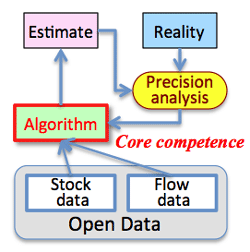
>Top 2. Open Data Movement:
- >Top OGP (Open Government Partnership) was launched in 2011 to provide international platform.
- now 65 countries participated.
- Objective: governments become more sustainably transparent, accountable, responsible to citizens; improving quality of services.
- Open Knowledge Festival, Berlin, 2014
- Biggest open data and open knowledge conference; 1,000 people from 60 countries.
- further the forces of openness as a positive force for change.
- focus on participation and interaction, rather than just presenting.
- Use "Etherpad", OSS online editor providing collaborative editing in real time.
2. オープンデータ活動:
- GGP (Open Government Partnership, 2010)
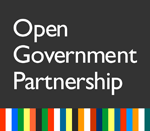
- OKF, Berlin, 2014

>Top 3. Open Data Business:
- Open for Business: How Open Data can help achieve the G20 growth target?: estimated $13T in 5 years.
- 55% of GDP growth of G20 (2%) will be derived from Open Data related business.
- Summary of business opportunities:
- To normalize & make cleaning of the original data for easier use as open data.
- To support installation of portal site of open data (particularly of various public data), or its hosting services.
- To make visualization or mapping of the open data
- To create new services utilizing open data.
- >Top Two categories of Open Data Business:
- Application using open data: such as:
- 'CKAN' ; open data portal service developing & operation UK 'data.gov.uk'
- 'Socrata' : open data portal service of US local governments.
- Creating of a new business using open data; such as:
- 'Total Weather Insurance' ; guaranteeing revenue for agriculture business
- 'MRIS (Metropolitan Regional Information Systems)' and 'HomeSnap' ; information service for purchase of real estate
- 'Opower' ; advice for energy saving
- 'Zillow'; price evaluation of own real estate
- 'BillGuard'; warning service against illegal use of credit card
- 'iTriage' ; advice for introducing appropriate hospitals
- 'mypp.ie'; checking latest status of application for house construction.
- Structure of Open Data:
(by Tomihiko Azuma, 2014) > right figure
- Open data as the springboard of economics:
- It is costly for private sector to gain the public data.
- Open data is supplied by the government by free charge & easy way.
- Private sector could concentrate to develop excellent analysis model and algorithm for it, which would be competitive tool in the market.
- Europe and US aim to us open data as the springboard for their economic jump.
- Pure effect by using Open Data: (>right figure)
- >Top Time lag of economic effect:
- Cases of GPT (General Purpose Technology):
- Electricity: 40 years
- Internet: 25 years
- Open Data: could be about 10 years
- Methodology of forecast:
- by hearing research; subjective estimate
- Macroscopic estimate would be too much estimate; due to neglecting the cases of using other data than open data.
- Microscopic estimate would be too less estimate; due to inability considering all cases.
- Economic effect by using open data would be around 7.5%
- Because, ACIL Tasman estimated 5-15% of economic effect caused by using modern spatial information technology by open data.
- Decision making:
- The economic effect could be estimated about 7.5% after about 10 years.
- GDP of Japan is about ¥900T; share of Open Data would be 0.2 - 3%.
- Does the estimate of economic effect by open data could be regarded as the national top prioritized policy?
- Is there any other GPT in coming 10 years?
3. オープンデータビジネス:
- オープンデータの純効果
(by Toshiya Jitsuzumi)
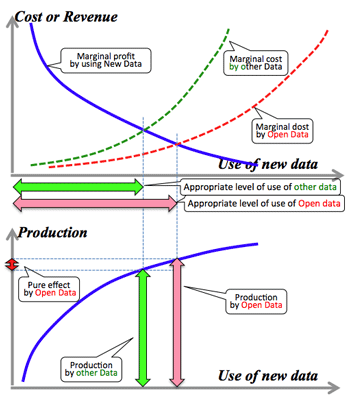
- Open Dataの構造

- Shift of Open Data:
By Hiroichi Kawashima
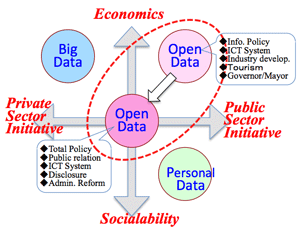
>Top 4. Open Data as the global strategy:
- US: President Obama: 'Open Government Strategy, 2009/1; discussion of Government 2.0:
- Data Act.
- World Bank, Washington DC
- O'Rally Media; movement of 'Code for America'
- >Top EU: 'Reuse of Public Sector Information, since the first 2000s, aiming COE (Center of Excellence) of Open Data.
- OKF (Open Knowledge Foundation), Cambridge, UK; performed 'Open Data Census'
- CKAN Association (Comprehensive Knowledge Archive Network)
- ODI (Open Data Institute), London, UK; performed 'Open Data Barometer' with WWW Foundation
- OGL (Open Government Licence) 2.0;
- a part of UK Government Licencing Framework (UKGLF)
- allows information to be used and reused with virtually no restrictions.
- Tim Berners-Lee; proposing 'Linked Open Data'; 'Raw Data Now!'
- OECD, Paris
- World:
- OGP (Open Government Partnership), by G8 summit.
- Main agenda by UK: 3K (Tax, Trade, Transparency); Open data is a part of Transparency issue.
- Worries about open data:
- of transparency
- of consistency of data
- of procedure making open data
- of response to the question about open data
4. 国際戦略としてのオープンデータ
- 米国と英国での先進的な動き
- やはり英語の優位性か
>Top 5. Promotion of Open Data:
- Preferable circulation of creation Open Data; by Yoshinobu Soda:
- Four stages of creating open data:
- To create data
- To provide data; needs transparency
- To analyze data; needs participation
- To develop, and support to business creation; needs collaboration
- Open Data are innovation of public sector;
- Innovation is a process of creating values;
- >Top Correlation of Open Data Creation (CPDD Model) and SECI Model: >right figure
5. オープンデータの推進:
- Circulaiton of Open Data:
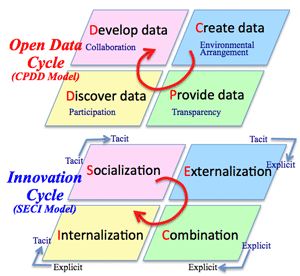
>Top
6. <Ref-1> File Format for Open Data:
- Tim Berners-Lee suggested 5-Star deployment scheme for Open Data.
What are the costs & benefits of ☆ Web data?
- Five Star Open Data:
- As a customer: you can
- look at it
- print it.
- store it locally.
- enter the data into any other system
- change the data
- share the data
- As a publisher:
- publish simply
- need not explain repeatedly to other that they can use your data.
- >Top Five Stars Open Data:
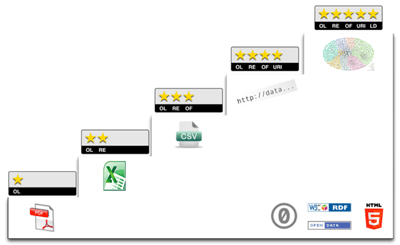
- Star - On the web with an open license; making data available on the web with an appropriate license to reuse is the first step.
- Star - Machine -readable data; Machin-readable data are structured and predictable, with well established and known e¥ways to query and consume it using software code.; CSV file could look like this. XML call ATOM and JSON are most commonly used to deliver the data when establishing API.
- Star - Non-proprietary formats; The data is in a format that does not require specific software or systems to access it. CSK file can be opened in any spreadsheet software, whether is Excel, Open Office, an iPad app etc.
- Star -RDF Standards; Resource Description Framework which is a framework for describing resources on the web. RDF breaks down data into a series of facts: Subject, Predicate, Object.
- Star - Linked RDF: goes a step further and describes meaning by making reference to "a source of meaning" on the web. The link in Linked RDF is via a URI (Uniform Resource Identifier) that contains the information, or an address plus a query to the database at that location.
6. 参考1: オープンデータ用ファイル形式
- オープンデータ評価フォーマット:
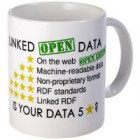
- ★
ともかくWeb上に公開
- ★★
データを構造化データとして公開。(Scan画像よりExcel)
- ★★★
オープンな形式(ExcelよりCSV)
- ★★★★
標準のRDF形式で表示
- ★★★★★
キーワードは、URIで関連情報にリンク
>Top 7. <Ref-2> Open Data market estimate (by McKinsey & Co., 2013/10)
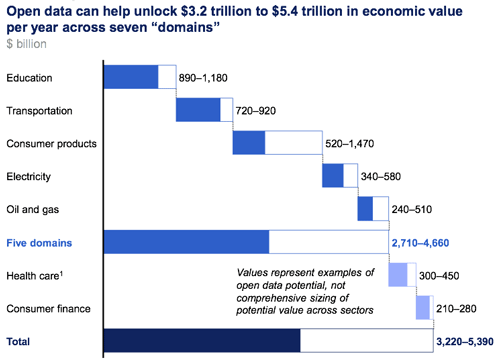
7. 参考2: オープンデータ市場
(by McKinsey, 2013/10)
>Top 8. <Ref-3> Creative Commons:
- Creative Commons: governed by applicable copyright law; established in 2001
- Attribution (BY): give the author or licensor the credits.
- >Top Share-alike (SA); may distribute derivative works only under identical license that governs the original work.
- Non-commercial (NC); may distribute only for non-commercial purpose.
- No derivative works (ND): may distribute only verbatim copies of the work (not derivative works)
- Regularly used licenses are as follows:
- BY
- BY+ND
- BY+SA
- BY+NC
- BY+NC+ND
- BY+NC+SA
8. 参考3: クリエイティブ・コモンズ:
- クリエイティブコモンズ:
- 表示 (BY):著作権者の表示
- 継承 (SA):改変作品も元と同じライセンス
- 非営利 (NC):
- 改変禁止 (ND):
- 通常以下の5種類
- BY
- BY+ND
- BY+SA
- BY+NC
- BY+NC+ND
- BY+NC+SA
>Top 9. <Ref-4> SECI Model:
- Ikujiro Nonaka and Hirotaka Takeuchi proposed the knowledge creating process; called SECI Model.
- Knowledge creation is a continuous process of interaction of implicit (tact) and explicit knowlege.
- Socialization: To communicate & recognize & confirm implicit knowlege through F2F like appreenticeship.
- Externalization: To embed & develop combined implicit knowledge into explicit one.
- Combination: To try & apply explicit knowledge into prototype, and recongnize a new discovery.
- Internalization: To understand & reflect the in-depth knowledge through activities.
9. <参考> SECIモデル
- 共同化:暗黙知の共有・創造
冬の忍耐;
- 表出化:暗黙知の形式知化
春の出芽
- 結合化:形式知の組合・発展
夏の開花
- 内面化:経験の新たな暗黙知化秋の結実
Comment
- Both 'Open' and 'Data' are quite common words, but it is a long way to attain 'Open Data.'
- オープンとデータもごく普通の言葉だが、オープンデータ実現へは長い道のりである。
Open Data |
Cat:ICT |
|
Masahiko Shoji (庄司昌彦), GLOCOM, etc. |
14z08u/18117r |
Titile |
Open Data |
オープンデータ |
|---|---|---|
Tag |
Definition of Open Data; OGP; Open Data Business; COE; CPDD/SECI; Time lag 10 years; Five Stars Open Data; RDF; SA; ; | |
Why |
|
|
Résumé |
Remarks |
|
>Top 0. Preface:
|
0. 序文:
|
|
>Top 1 Definition and Objective:
|
1. 定義と目的:
|
|
>Top 2. Open Data Movement:
|
2. オープンデータ活動:
|
|
>Top 3. Open Data Business:
|
3. オープンデータビジネス:
|
|
>Top 4. Open Data as the global strategy:
|
4. 国際戦略としてのオープンデータ
|
|
>Top 5. Promotion of Open Data:
|
5. オープンデータの推進:
|
|
>Top 6. <Ref-1> File Format for Open Data:
|
6. 参考1: オープンデータ用ファイル形式
|
|
>Top 7. <Ref-2> Open Data market estimate (by McKinsey & Co., 2013/10)
|
7. 参考2: オープンデータ市場 |
|
>Top 8. <Ref-3> Creative Commons:
|
8. 参考3: クリエイティブ・コモンズ:
|
|
>Top 9. <Ref-4> SECI Model:
|
9. <参考> SECIモデル
|
|
Comment |
|
|